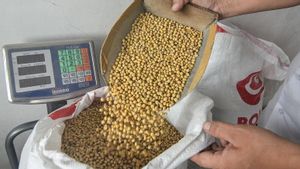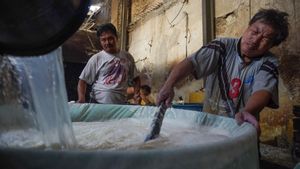JAKARTA - World soybean prices this week decreased compared to the previous week. However, domestic prices are still very high. The impact of high soybean prices has forced craftsmen to stop production and increase the selling price. Therefore, the Ministry of Trade asked soybean importers to adjust their prices.
The Director-General of Domestic Trade at the Ministry of Trade, Oke Nurwan, said the price adjustment for imported soybeans was aimed at making tempeh and tofu craftsmen continue to produce.
"World soybean prices have decreased. We ask for support from business actors, especially soybean importers, to maintain the price of imported soybeans so that prices for tofu and tempeh at the craftsman level remain stable", he said in an official statement, Monday, May 31.
Oke said that his party appreciated the commitment of soybean business actors in maintaining the availability and stability of soybean prices during fasting and Eid Al-Fitr 2021.
SEE ALSO:
Based on data from the Chicago Board of Trade (CBOT), soybean prices began to show a downward trend. In the fourth week of May 2021, soybean prices were in the range of USD 15.04 per bushels or IDR 9.220 per kilogram (kg) landed price, down 5.1 percent from the previous week of USD 15.86 per bushels or IDR 9.604 per bushel landed prices.
According to Oke, world soybean prices have the potential to continue to decline. This is because some producing countries have entered the harvest period.
"This will have an impact on the temporary adjustment of the prices of tofu and tempeh by 10 to 15 percent", he said.
Oke hopes that the decline in world soybean prices can be responded positively by domestic soybean business actors, both importers, distributors, and tofu and tempeh craftsmen. This is done to maintain the continuity of the national tofu and tempeh business.
The Ministry of Trade will monitor price movements
Oke emphasized that the Ministry of Trade will periodically monitor and evaluate the movement of world soybean prices, both when there is a decrease or increase in price. The government will ensure the price of soybeans at the level of tofu and tempeh craftsmen, and that prices in the market remain affordable to the public.
"We appeal to importers to ensure and continue to distribute soybean stocks regularly to all tofu and tempeh craftsmen, including members of the Indonesian Tofu and Tempeh Cooperative Association (Gakoptindo) at the provincial and district/city Puskopti", he said.
The Ministry of Trade will ensure that soybean distribution continues to avoid stock shortages. In the next three months, importers will distribute at least 5.000 tons of soybeans per month to meet the needs of tofu and tempeh craftsmen.
Later, said Oke, Gakoptindo members could collect directly from the importer's warehouse. According to him, the cooperation in distributing soybeans is expected to be a momentum for the revival of national tofu and tempeh craftsmen to continue producing.
"So, people will continue to get tofu and tempeh as a source of protein at affordable prices", he explained.
[/read_more page]
Prices at the national level are still high
Soybean prices at the national level are still high, although prices at the global level have begun to decline. Due to the high price of soybeans, tempeh and tofu craftsmen in Bandung decided to go on a production strike. One of them is in the Cibuntu tofu center, where soybean processing workers began to quit on May 28.
They followed a circular letter from the West Java Tofu Tempeh Association which stated that the tofu and tempeh craftsmen agreed to shut down production and sales for three days until Sunday, May 30.
After the production strike, which was held by tofu craftsmen in Bandung, the price of tofu increased between 10 and 25 percent or ranged from IDR 500 to IDR 1.000 per pack. The traders were forced to increase the selling price to get around the raw materials which were still expensive.
Not only in Bandung but the increase in soybean prices also occurred in Boyolali. The high price of raw materials for making tempeh and tofu makes craftsmen reduce their production.
A tofu craftsman in Benden Village, Banyudono, Boyolali, Tanto (56) said the price of soybeans at Boyolali Market is still high, selling up to IDR 11.000 per kilogram (kg) or an increase of IDR 1.000 per kg so that many tofu entrepreneurs have lowered their production.
Tanto explained that the price of soybeans in Boyolali ahead of Eid Al-Fitr was initially sold at IDR 9.000 per kg, then increased to IDR 10.000 per kg, and has now increased to IDR 11.000 per kg. Craftsmen know that many are worried about the high price of soybeans, their business could go out.
Because of that, Tanto admitted that to deal with the high price of raw materials, he was forced to increase the selling price of tofu. The price of tofu that was originally sold for IDR 40.000 per print has now been increased to IDR 45.000 per print. Each tofu print can be cut into 200 pieces. He was also forced to reduce production.
"I reduced the production of tofu because it also resulted in a decrease in market demand for both buyers and traders", he said when interviewed by Antara, Sunday, May 30.
Tempeh and tofu producers ask Logistics Agency to import soybeans
The Indonesian Tofu and Tempeh Producers Cooperative (Kopti) asked the government to regulate the soybean trade, by allowing Logistics Agency (Bulog) or the Kopti cooperative to import soybeans.
For your information, currently, pure soybean imports are only carried out by the private sector, resulting in price fluctuations.
"The government must improve the soybean trade, by setting import quotas. For example, 70 percent by the private sector and 30 percent by the government or us", said Secretary-General of Cooperatives, Hugo Siswaya, Monday, May 31.
According to him, Bulog's soybean price will later function to control prices in the market, like other commodities such as rice and sugar.
"Right now, all soybean import quotas are held by the private sector, so we are now only waiting for the kindness of importers so that soybean prices can be affordable again", he said.
The English, Chinese, Japanese, Arabic, and French versions are automatically generated by the AI. So there may still be inaccuracies in translating, please always see Indonesian as our main language. (system supported by DigitalSiber.id)



















